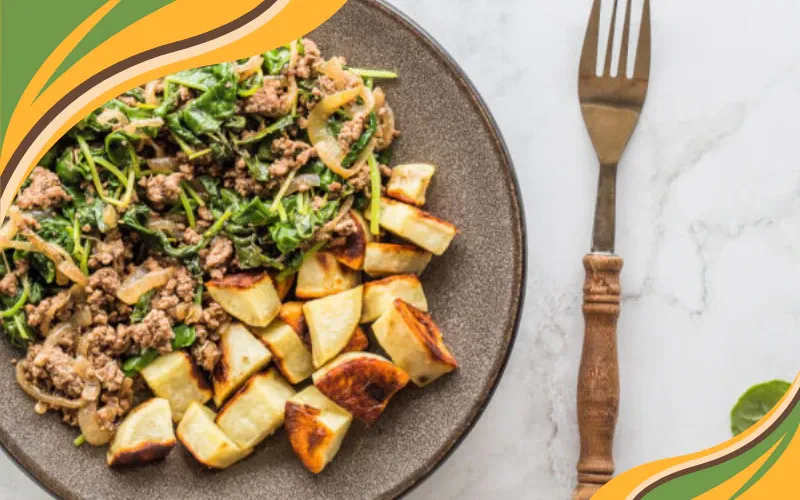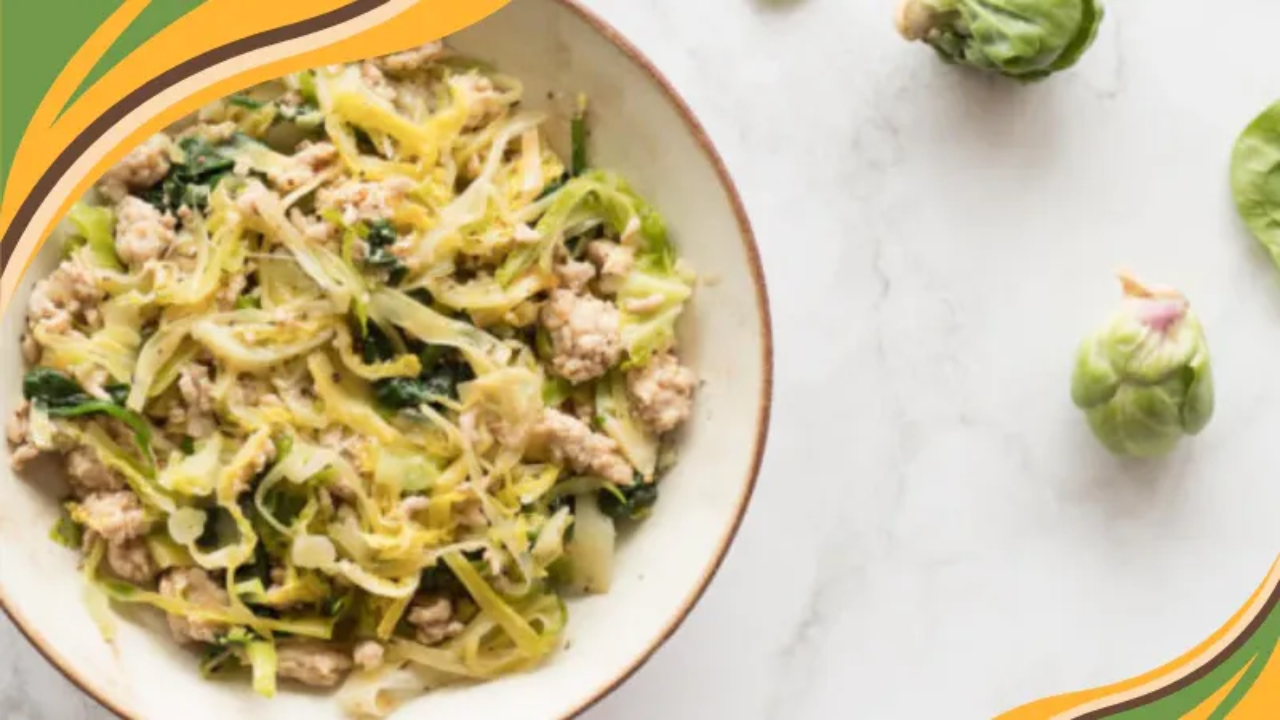
Cortisol, belly fat, and food: a survival guide for women over 50
𝗣𝗿𝗲𝗽 𝗧𝗶𝗺𝗲: None
𝗖𝗼𝗼𝗸 𝗧𝗶𝗺𝗲: None
𝗦𝗲𝗿𝘃𝗶𝗻𝗴𝘀: One empowered woman ready to work with her body
Weight gain after 50 can feel frustrating, especially when you’re eating well, moving more, and doing everything “right.” But here’s the truth: 𝘆𝗼𝘂𝗿 𝗯𝗼𝗱𝘆 𝗶𝘀𝗻’𝘁 𝗯𝗿𝗼𝗸𝗲𝗻. It’s just different now.

One of the biggest changes? 𝗛𝗼𝘄 𝘆𝗼𝘂𝗿 𝗯𝗼𝗱𝘆 𝗵𝗮𝗻𝗱𝗹𝗲𝘀 𝘀𝘁𝗿𝗲𝘀𝘀. And one hormone you might not be thinking about is playing a bigger role than you realize.
This is what 𝗴𝗲𝘁𝘁𝗶𝗻𝗴 𝗿𝗲𝗮𝗹 𝘄𝗶𝘁𝗵 𝘄𝗲𝗶𝗴𝗵𝘁 𝗹𝗼𝘀𝘀 looks like, understanding the shifts, supporting your body, and making small changes that actually work.
𝗪𝗵𝘆 𝗰𝗼𝗿𝘁𝗶𝘀𝗼𝗹 𝗵𝗶𝘁𝘀 𝗵𝗮𝗿𝗱𝗲𝗿 𝗮𝗳𝘁𝗲𝗿 𝟱𝟬
Once you hit menopause, estrogen and progesterone drop. That’s normal. But what it means is that you become 𝗺𝗼𝗿𝗲 𝘀𝗲𝗻𝘀𝗶𝘁𝗶𝘃𝗲 𝘁𝗼 𝘀𝘁𝗿𝗲𝘀𝘀.
Even small stressors can lead to a bigger cortisol release. Cortisol is your body’s main stress hormone. It’s not bad, it’s designed to help you survive. But when it stays elevated too long, it can:
• 𝗘𝗻𝗰𝗼𝘂𝗿𝗮𝗴𝗲 𝗳𝗮𝘁 𝘀𝘁𝗼𝗿𝗮𝗴𝗲 (especially around the belly)
• 𝗜𝗻𝗰𝗿𝗲𝗮𝘀𝗲 𝗰𝗿𝗮𝘃𝗶𝗻𝗴𝘀 for sugar and salty snacks
• 𝗕𝗿𝗲𝗮𝗸 𝗱𝗼𝘄𝗻 𝗺𝘂𝘀𝗰𝗹𝗲
• 𝗗𝗶𝘀𝗿𝘂𝗽𝘁 𝘆𝗼𝘂𝗿 𝘀𝗹𝗲𝗲𝗽
And here’s the kicker, poor sleep increases cortisol, which then leads to more fat storage and more cravings. That’s a hard cycle to stay motivated in.

𝗛𝗼𝘄 𝗳𝗼𝗼𝗱 𝗰𝗵𝗼𝗶𝗰𝗲𝘀 𝗰𝗮𝗻 𝗵𝗲𝗹𝗽
You can’t always control life’s stress, but you can eat in a way that helps calm your system and balance your hormones.
Here’s what works:
𝗦𝘁𝗮𝗿𝘁 𝘄𝗶𝘁𝗵 𝗽𝗿𝗼𝘁𝗲𝗶𝗻
Aim for 20–30g at each meal. This helps keep your blood sugar stable and supports muscle, which protects your metabolism.
Try:
Eggs
Greek yogurt or cottage cheese
Fish or chicken
Lentils or tofu
𝗔𝗱𝗱 𝗳𝗶𝗯𝗲𝗿-𝗿𝗶𝗰𝗵 𝗰𝗮𝗿𝗯𝘀
Instead of white bread, pasta, or sugary snacks, go for options that keep you full and support gut health.
Try:
Leafy greens
Quinoa or oats
Beans or sweet potatoes
𝗜𝗻𝗰𝗹𝘂𝗱𝗲 𝗵𝗲𝗮𝗹𝘁𝗵𝘆 𝗳𝗮𝘁𝘀
Your brain and hormones love fats. They help reduce inflammation, improve satiety, and keep your meals balanced.
Try:
Avocados
Walnuts or chia seeds
Olive oil or salmon
𝗖𝘂𝘁 𝗯𝗮𝗰𝗸 𝗼𝗻 𝗰𝗮𝗳𝗳𝗲𝗶𝗻𝗲 𝗮𝗻𝗱 𝗮𝗹𝗰𝗼𝗵𝗼𝗹
Both can increase cortisol and disrupt sleep. If you’re feeling wired or waking up tired, consider reducing your intake.
𝗗𝗼𝗻’𝘁 𝘀𝗸𝗶𝗽 𝗺𝗲𝗮𝗹𝘀
Going too long without food can stress your body, which may lead to a cortisol spike. Eating balanced meals regularly keeps you more stable and less prone to cravings.
𝗡𝗼𝘁𝗲𝘀
𝗧𝗵𝗶𝘀 𝗶𝘀 𝗻𝗼𝘁 𝗮𝗯𝗼𝘂𝘁 𝗽𝗲𝗿𝗳𝗲𝗰𝘁𝗶𝗼𝗻. It’s about creating small, doable shifts that support your real life.
𝗙𝗲𝗲𝗹𝗶𝗻𝗴 𝘀𝘁𝘂𝗰𝗸 𝗶𝘀 𝗻𝗼𝗿𝗺𝗮𝗹. Weight loss over 50 is different, but that doesn’t mean it’s impossible.
𝗧𝗵𝗲 𝗺𝗼𝗿𝗲 𝘆𝗼𝘂 𝘀𝘂𝗽𝗽𝗼𝗿𝘁 𝘆𝗼𝘂𝗿 𝗵𝗼𝗿𝗺𝗼𝗻𝗲𝘀, 𝘁𝗵𝗲 𝗺𝗼𝗿𝗲 𝘆𝗼𝘂𝗿 𝗯𝗼𝗱𝘆 𝘄𝗶𝗹𝗹 𝗿𝗲𝘀𝗽𝗼𝗻𝗱.
𝗬𝗼𝘂𝗿 𝗺𝗲𝘁𝗮𝗯𝗼𝗹𝗶𝘀𝗺 𝗵𝗮𝘀 𝗰𝗵𝗮𝗻𝗴𝗲𝗱, 𝗯𝘂𝘁 𝘆𝗼𝘂 𝗮𝗿𝗲 𝗻𝗼𝘁 𝘀𝘁𝘂𝗰𝗸. When you learn how to support your body’s natural rhythms, everything starts to feel easier.
Energy improves. Cortisol regulates. Sleep gets deeper. You feel more like yourself again.
Want help building a plan that works with your body instead of against it?
💛 Join the waitlist for our program!
We’re doing this together, real food, real hormones, real results.
Nutrition Table
This post doesn’t focus on a single recipe, but here’s what a hormone-balancing meal might include:
|
Nutrient |
Amount |
|---|---|
|
Calories |
~400–500 |
|
Protein |
25–30g |
|
Fat |
15–20g |
|
Carbs |
25–35g |
|
Fiber |
8–12g |
|
Sugar |
Low (5g or less) |
|
Sodium |
Moderate |
|
Calcium |
Moderate |
|
Iron |
Moderate |

Stay connected with news and updates!
Join our mailing list to receive the latest news and updates from our team.
Don't worry, your information will not be shared.
We hate SPAM. We will never sell your information, for any reason.












